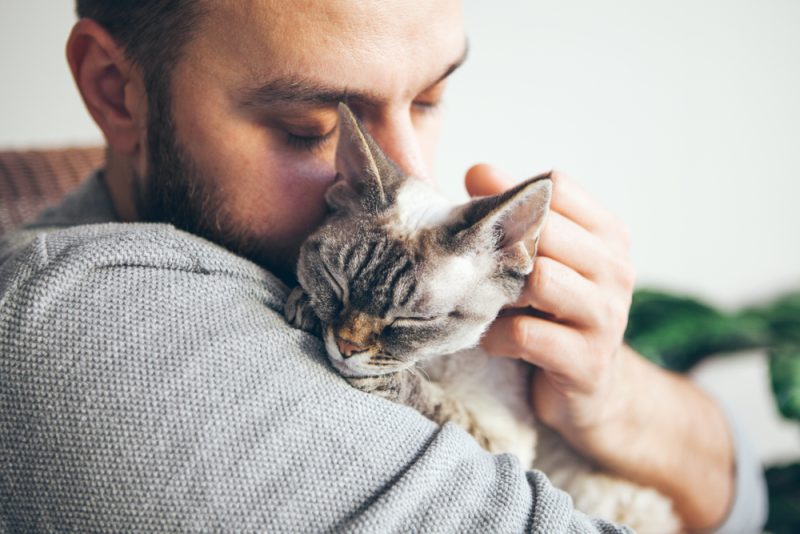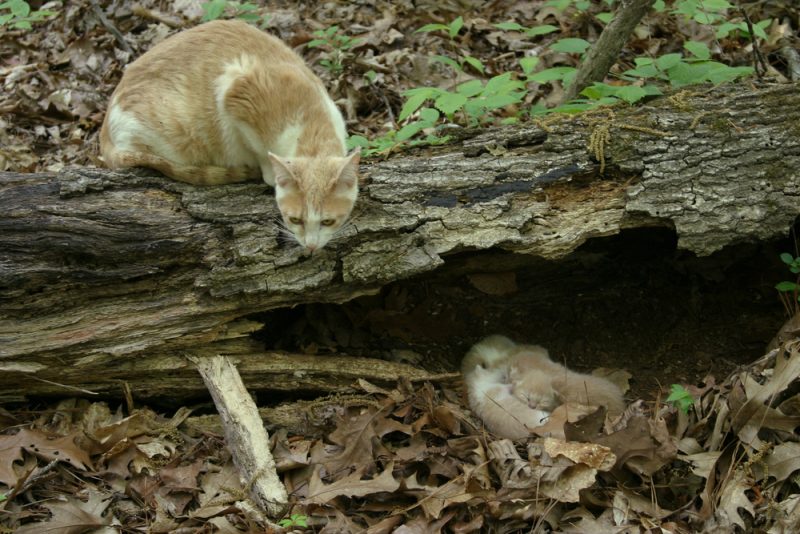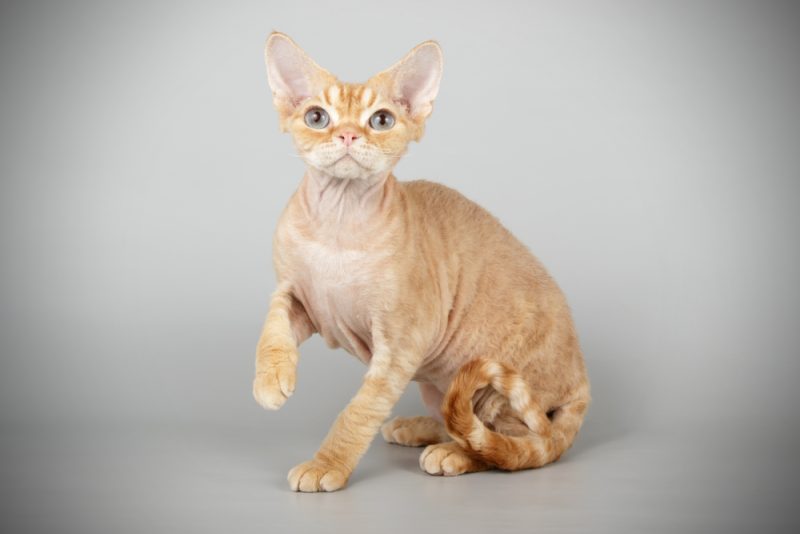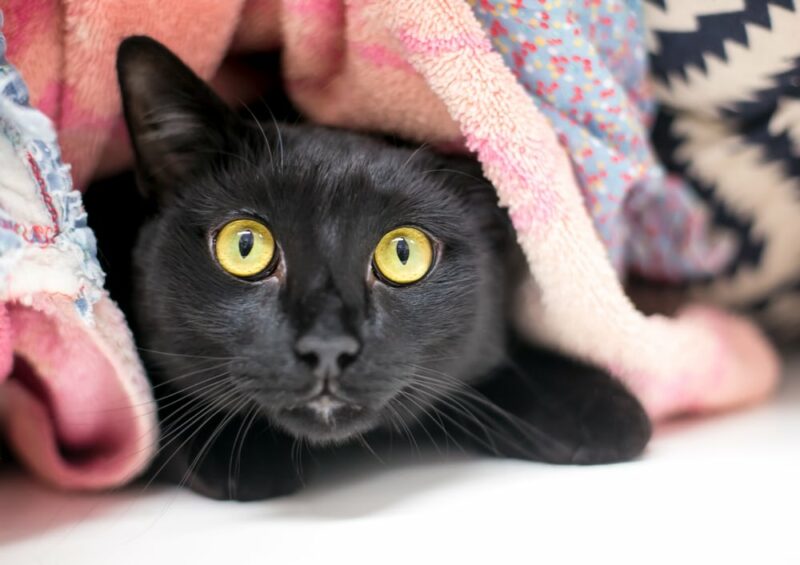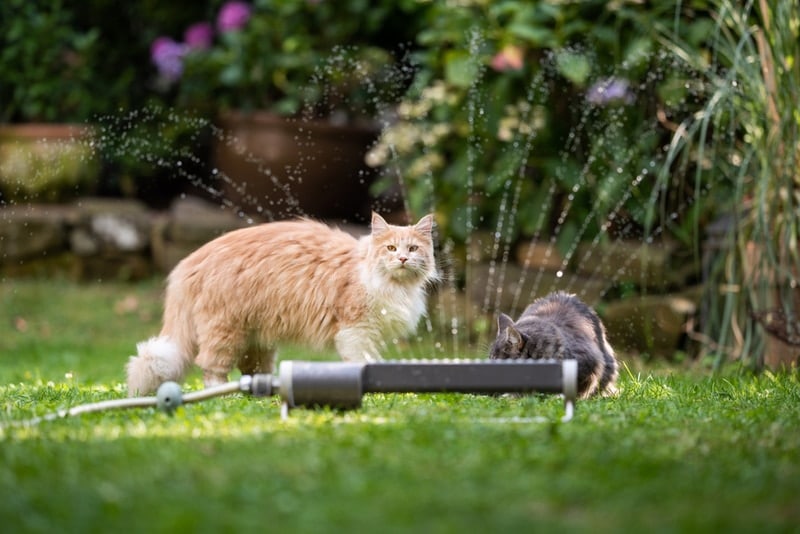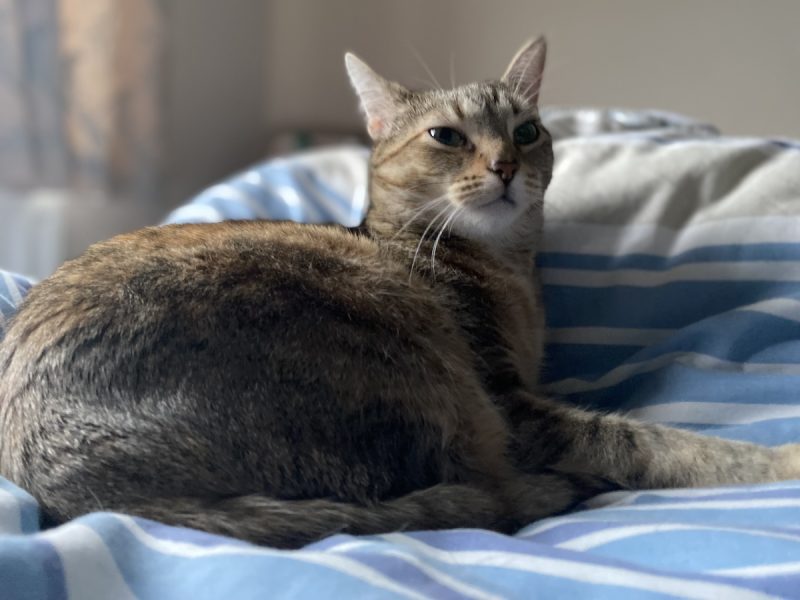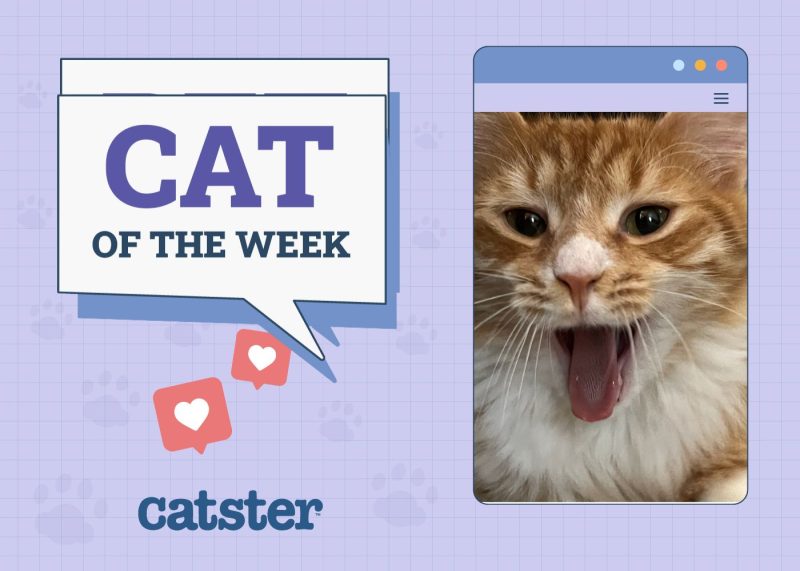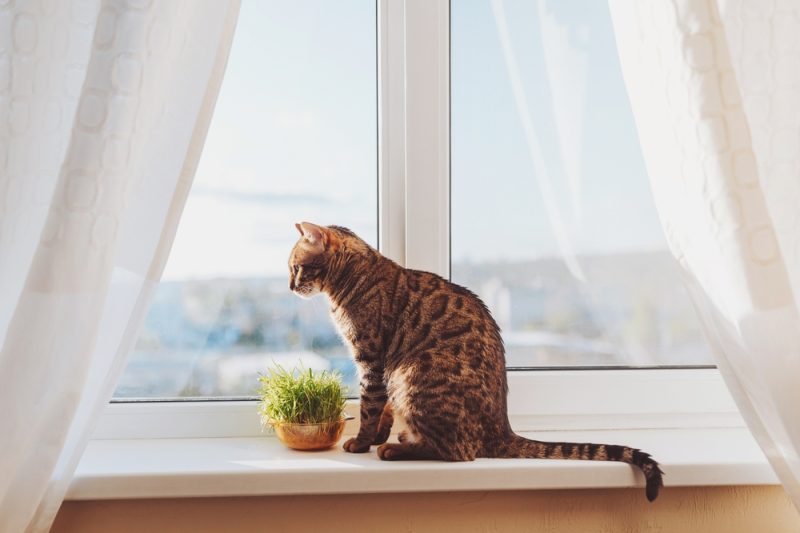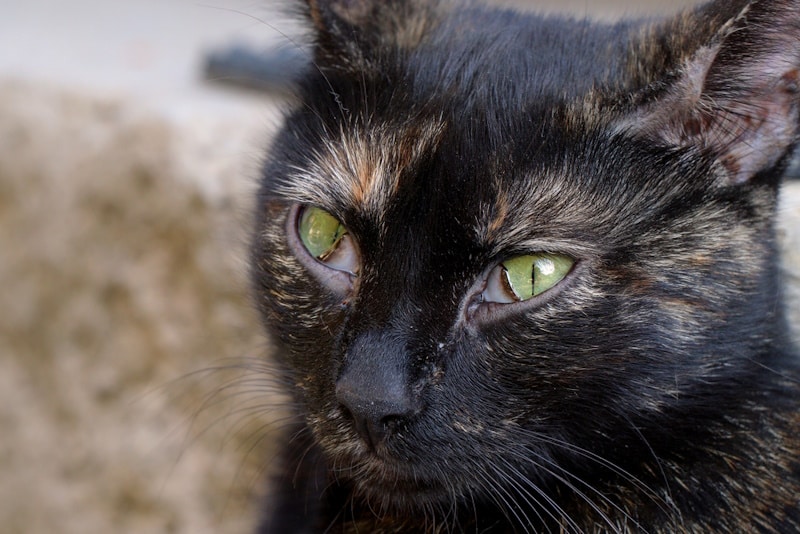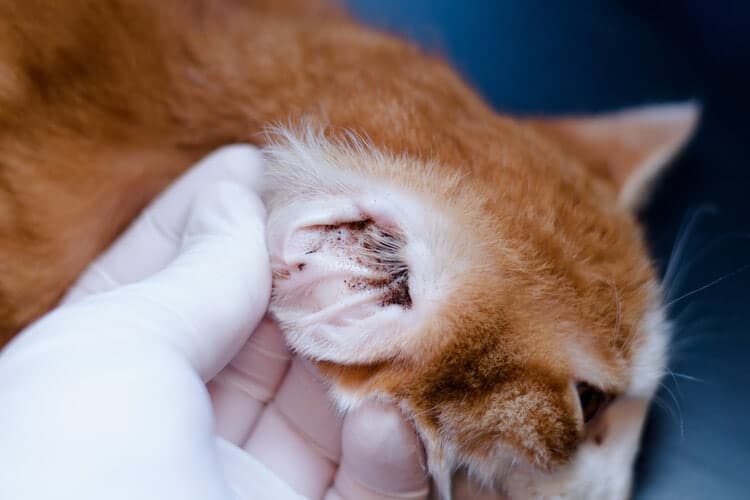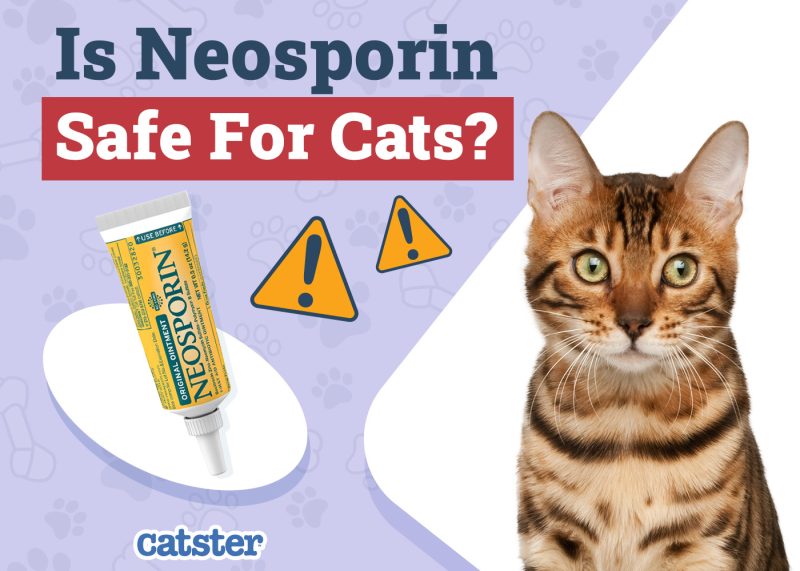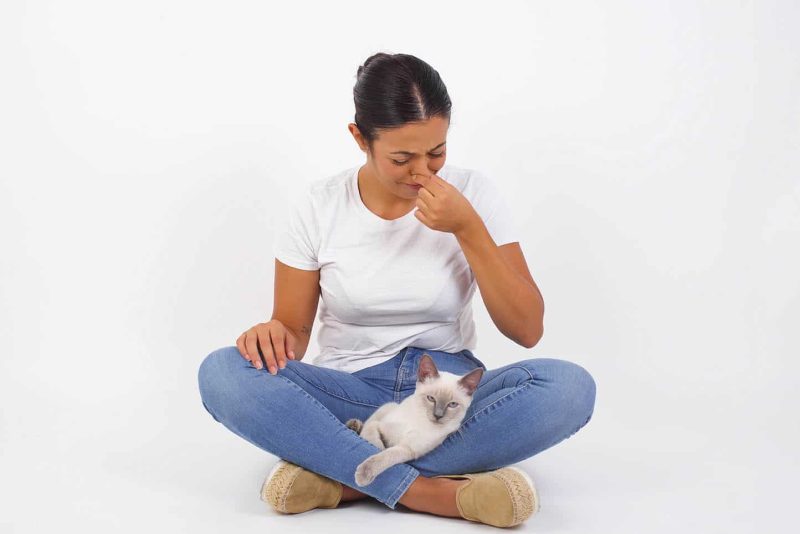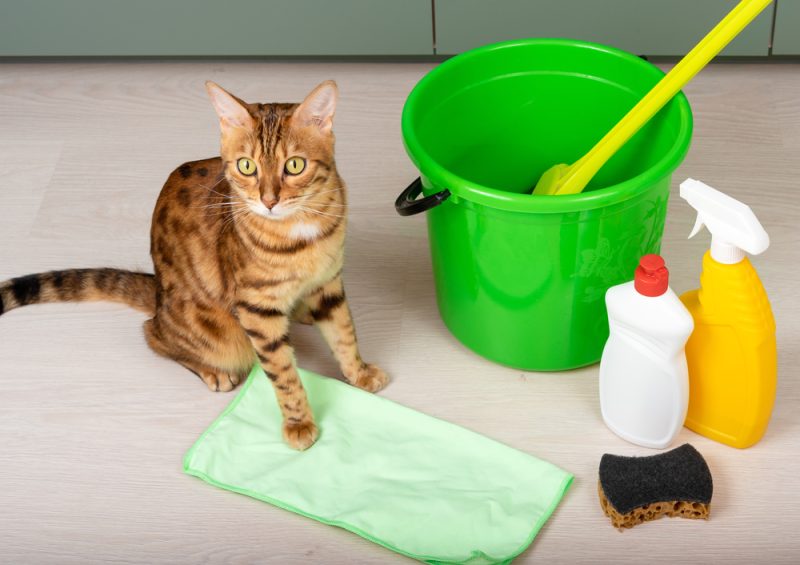In this article
Every cat is unique: Some are fearless and bold, while others are calm and gentle. Still others cats tend to be nervous and anxiety-ridden.
But sometimes, things go on in the home that can unsettle even the bravest feline, and it’s at these times that we cat owners need to take steps to ensure that our pets are secure and happy.
In this article, we look at what can stress out a cat and the best ways to make your cat feel safe.

What Can Make Cats Feel Insecure?
Most cats, regardless of their temperament, will respond fearfully under certain circumstances. Cats are both predators and prey, so there’s a good reason that they might seem to jump at everything!
Felines love routine, and anything out of the ordinary usually sets off a fear response. Here are common stressful events for cats.
Lack of Socialization
The socialization period is a time early in a kitten’s life when they start to learn what is safe in their environment by being exposed to different experiences, people, pets, and sounds in a positive and gradual way. If a kitten hasn’t had adequate socialization at a young age, they may be more fearful and anxious.
If you’re the owner of an adult cat that wasn’t socialized enough, you’ll need to try to keep their environment as free from drastic changes as possible and introduce them to new situations slowly, so as not to overwhelm them.
People Coming and Going
Changes to the household, such as a new baby or roommate, or the loss of a human companion, can be highly stressful for cats. According to a 2016 study, a stranger visiting was the most common stressful event for a cat.
You’ll want to ensure that your cat has a safe and quiet place to retreat and try to maintain their usual routines as much as possible. Introduce your cat to new people gradually using toys and treats to ensure positive experiences.
Change in Schedule
Any change to your usual schedule, like different work hours, leaving and coming home at different times, or suddenly working from home, can stress out your cat.
Ensure that your cat has a safe and comfy place to go, and if you’re unable to make a slow transition, try to spend extra time with your cat—playing with, petting them, giving them treats, or doing whatever works best for your kitty.
Loud Noises
This can be as simple as dropping something loud inside the house or fireworks and thunderstorms. Make sure your cat has a safe place to hide, and it’s usually best to let them stay there until they are ready to come out.
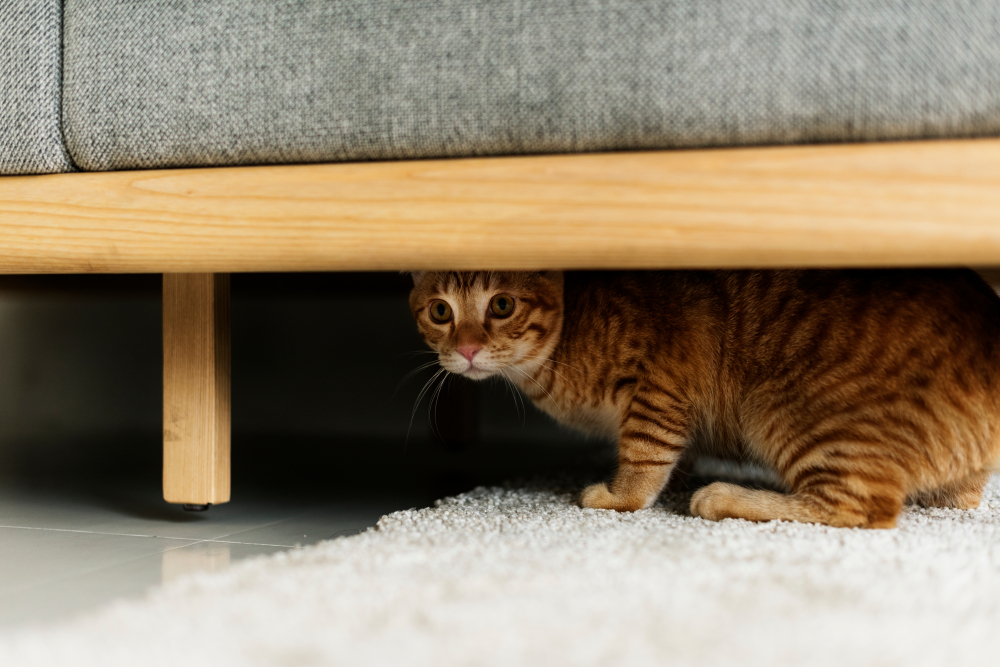
Neighborhood Cats
Indoor cats can become stressed when outdoor cats (or dogs) encroach on their territory. Observing predators or other neighborhood felines can make some cats stressed and anxious.
It can help if you close your curtains or blinds during these times. Experts also recommend using classical music and pheromones (like Feliway spray and/or diffuser) to distract and relax your cat.
Rescue Background
Cats that come from an uncertain background can understandably be stressed. If they are strays or adopted from a rescue organization, there might have been neglect or abuse in their past, or they may not have had appropriate early socialization.
These cats need plenty of time and patience. You need to leave them alone when they are in hiding and never force any interactions. They will learn to trust you in time.
Multi-pet Home
Living with other pets, including other cats, can definitely cause stress. The dynamics of each multi-cat household is variable, but cats can compete for resources that are essential for them. This includes food, water, litter boxes, high spaces to rest, scratching posts, places to hide, toys and interactions with you. Think about these resources to help prevent conflict and anxiety. Each cat must have their own food bowl, and in some cases, your cats might need to be fed separately.
As far as litter boxes go, you should have a litter box for each cat, plus one more. So, if you have two cats, you should have three litter boxes.
New Scents
If you’ve started using a new scent in the home—a new soap, scented candles, new laundry detergent, etc.—some cats might not be too happy about this.
Cats have sensitive noses and might dislike the smell of something new. Try using unscented items and if possible, keep the windows open. There are specific scents that cats simply dislike; for example, don’t use anything citrus or with a mint odor. Regardless of the scent, the majority of essential oils are toxic to cats and so they should be kept well away from them.
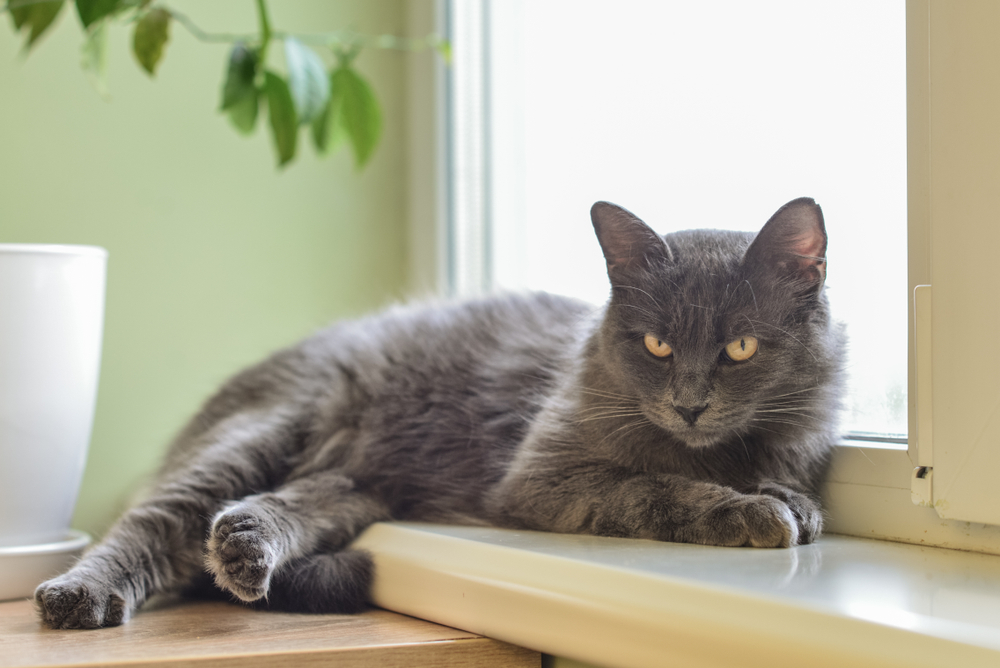

How to Make Your Cat Feel Safe
Fortunately, there are quite a few steps that you can take to help make your cat feel safer.
1. Know Their Body Language
As a cat owner, you should become familiar with your pet’s body language. Sometimes, it’s apparent how your cat is feeling, but certain signals that they send can be subtle.
When your cat is showing signs of fear and anxiety, it’s usually best to give them some space but work to avoid or reduce the things that are scaring them.
2. Establish a Routine
Cats are not fans of change, so it’s essential to stick to a routine as much as possible. A relatively stable home and predictable routine can go a long way toward helping your cat feel safe.
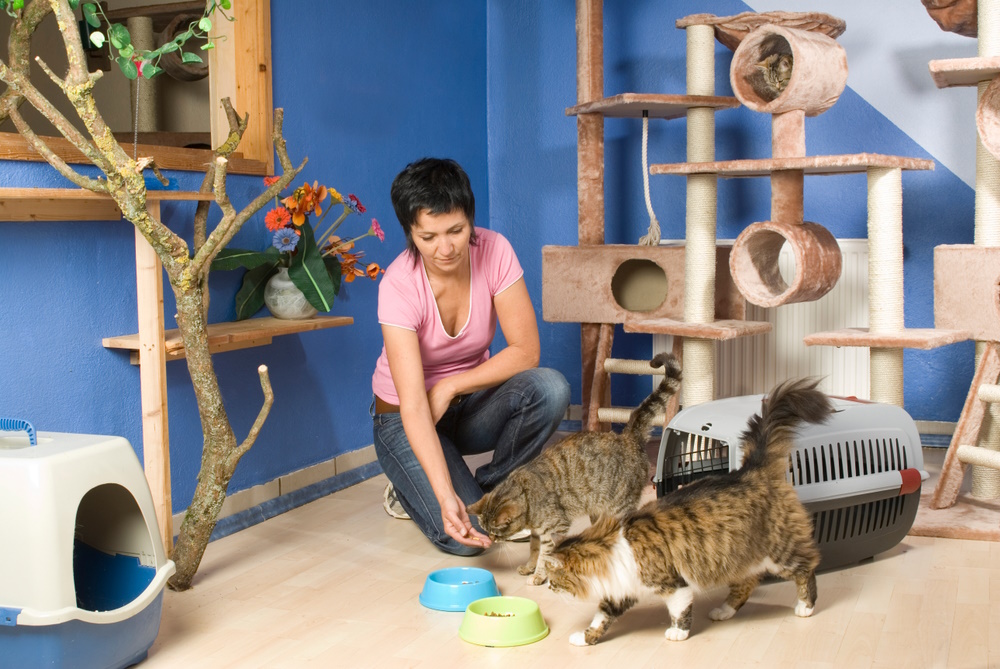
3. Provide Enrichment
This is where you need to ensure that your cat has everything that they need to be a cat. This includes offering toys like crinkle balls and toy mice that they can play with on their own. You should also invest in toys that you use to play with your cat, such as wands and fishing pole toys. Any toys with string should only be used under your supervision however.
Ensure that your cat has plenty of scratching posts, and consider adding a perch near a window so your cat can watch the birds outside.
Food puzzle toys can also help with mental stimulation and entertainment when you’re not around. The more enrichment that your cat has, the better.
Looking for toys that will cater to the many needs of your cat? The Hepper Hi-lo Cat Scratcher is one of our favorite cat products, and it will encourage your cat to get active. Its clever three-angle design offers multiple ways for your cat to climb, stretch, and exercise. Made of a sturdy plywood base and a replacement cardboard insert, this scratcher is an option that cats can enjoy for years to come. If your cat requires a little encouragement for self-play, the Hepper Catnip Mice Toy Set is a fantastic choice for their instinctual needs. Made with natural, bite-resistant hessian fabric and filled with organic catnip. Cats can satisfy their natural prey instincts while getting the physical activity they need to thrive.
| Image | Product | Details | |
|---|---|---|---|
Great for Exercise
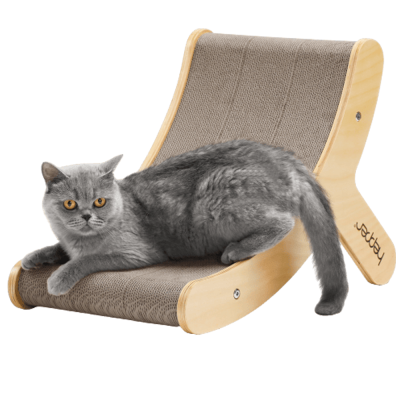
|
Hepper Hi-Lo Cat Scratcher |
|
Check Price |
Encourages Self-Play
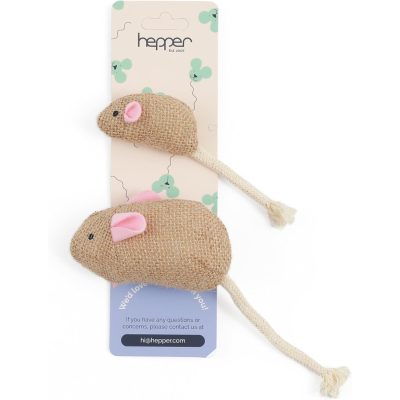
|
Hepper Catnip Mice Toy Set |
|
Check Price |
At Catster, we've admired Hepper for many years, and decided to take a controlling ownership interest so that we could benefit from the outstanding designs of this cool cat company!
4. Install Vertical Spaces
Cats prefer being up high so they can keep an eye out for prey and predators. Giving your cat the ability to hang out from high up will do much for an anxious cat!
Invest in a good and sturdy cat tree: If the cat tree wobbles, your cat won’t want to use it. If your cat is large, always check the measurements on the perches, as many cat trees seem to be made for kittens or small cats.
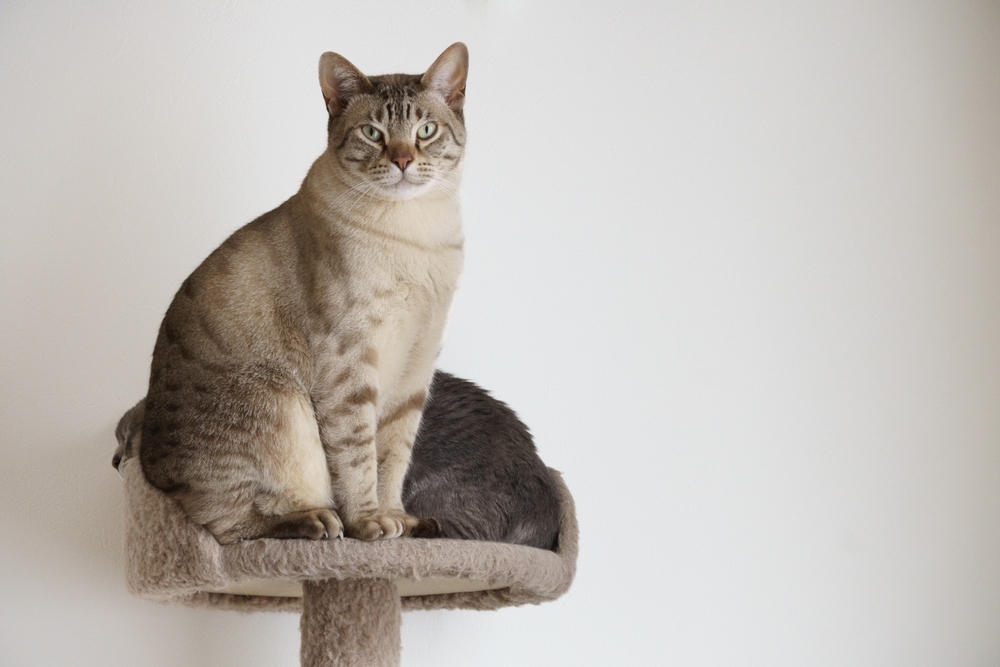
5. Set Up Quiet Spaces
You should ensure that your cat has a quiet space when they have the urge to hide. This might be under your bed, or you might need to leave a closet door partly open.
This is vital for cats that want to hide if someone they don’t know is visiting or when there’s a thunderstorm or fireworks.
You can also use a room that isn’t used that often and set it up with all your cat’s things. Even a cardboard box with holes cut into it can be effective.
6. Use Pheromones
You can try using synthetic calming cat pheromones, which have been known to help anxious cats. Calming supplements are also available which contain varying ingredients such as L-tryptophan. Your vet can help you choose the best one for your cat.
If you need to speak with a vet but can't get to one, head over to PangoVet. It's an online service where you can talk to a vet online and get the advice you need for your pet — all at an affordable price!

7. Do Slow Introductions to New Things
Anything new to be added to your household should be given a slow introduction to your cat. If you know that changes are happening to the home, try to make them gradual. For example, you can take steps to prepare your cat for a new baby.
8. Stay Calm
Your cat will definitely pick up on your moods, so if your cat is already stressed and you’re having a mini meltdown, it will likely exacerbate the problem for your pet.
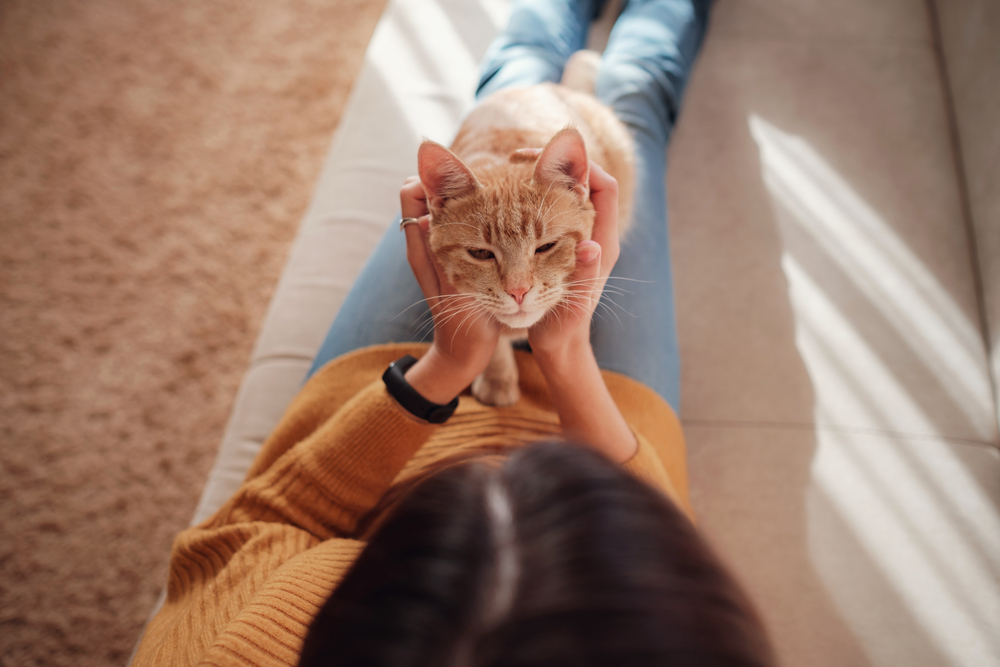
9. Provide Easy Access to Resources
Your cat’s most important resources are food, water, and the litter box. Remember to separate the food bowls and litter boxes.
You should also ensure that the litter box is not in a high-traffic or noisy area. So, don’t put it next to the front door or near the laundry machines, particularly if your cat is skittish.
10. Consult a Professional
If your cat seems more fearful than what you might consider normal, you should have a conversation with your veterinarian.
They might also be able to help you find a cat behaviorist who can work with you and your cat to help decrease their anxiety.
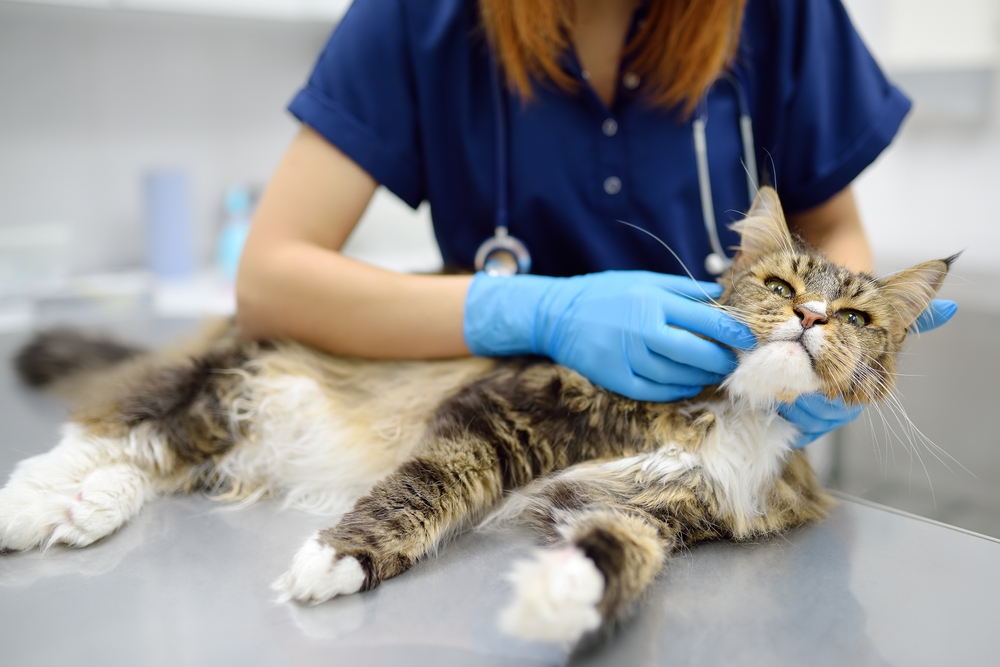

Signs That Your Cat Is Stressed
- Hiding
- Making themselves look small (crouching low and tucking everything in)
- Running away
- Freezing in place
- Wide eyes with dilated pupils
- Tail lowered and tucked in or swishing from side to side
- Ears flattened or swiveling quickly
- Eliminating outside of the litter box
- Arched back and puffed-up fur
- Hissing and spitting
- Biting and scratching

Conclusion
Some cats are more prone to being nervous than others. There are multiple causes of this kind of anxiety, but once you’ve established that your cat has an issue, it’s vital that you work to make your pet feel safe and comfortable.
It also might be a good time to take your cat to the vet to ensure that there aren’t any physical problems. They will also be able to give you guidance on helping make your cat feel safer.
Featured Image Credit: Veera, Shutterstock
